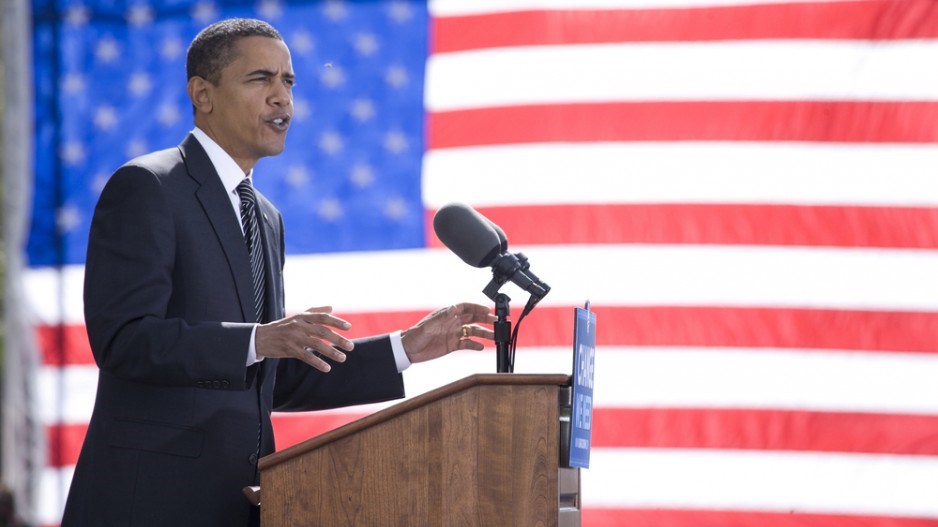Now that President Barack Obama has been re-elected, B.C. and Canadian businesses hope the politicking will tone down and the U.S. government can finally get its fiscal house in order.
Jock Finlayson, executive vice-president of the Business Council of BC, said Congress and the Obama administration will need to work quickly to ensure the government avoids running off the precipitous "fiscal cliff" it faces in the new year or risk plunging back into deep recession.
In addition to deciding whether to keep or modify the Bush-era tax cuts and various stimulus programs initiated by Obama, which include a temporary payroll tax cut, it will have to deal with the automatic spending cuts enacted last year when the bipartisan "super-committee" failed to negotiate a budget agreement in 2011.
Gary Doer, Canada's ambassador to the U.S., noted that B.C. is already benefiting from an improving U.S. housing market and America's decreasing household debt. But the fiscal cliff threatens to undermine that recovery.
"It's important for them to get an agreement," said Doer. "[The issue] is very short term, but it is real and will create lots of uncertainty if they don't manage it."
"They'll have to learn to get along," said Frank McKenna, Canada's former ambassador to the U.S., told Business in Vancouver. "With the U.S. system, it's based on building consensus, but there hasn't been a lot of it in the last four years. It's everybody's fervent hope that after the election we'll see more of it."
Kip Beckman, a principal economist at the Conference Board of Canada, noted that businesses are already delaying decisions because of the uncertainty tied to the fiscal cliff. If the U.S. federal government isn't able to come to an agreement, the economy would likely be pushed back into recession.
"The combination of cuts in government spending and higher taxes could knock 2% off GDP growth next year. We have the U.S. economy next year growing by 2.5%," said Beckman. "You knock a few percentage points off that and you're in recessionary territory. It's huge."
Birgit Matthiesen, special adviser in Washington, D.C. for the Canadian Manufacturers and Exporters, told BIV, "The devil will be in the details. We have already heard from Congressional leaders that tax reform, personal and corporate, will take priority position in the legislative calendar. That's something we're watching: what loopholes will be filled, what tax incentives and credits will be introduced, exempted, taken off the books, raised or lowered. They will be important."
Greg Noble, a Vancouver tax partner at Ernst and Young, suggested Canada's competitive edge isn't likely to change over the next few years, given the likelihood of tax increases in the second Obama administration, and while that might increase costs for Canadian companies expanding into the U.S., the opportunity could exceed the cost.
"They'll probably go anyway, because the consumer market is just so huge."
Rob Edel, chief investment officer at Vancouver's Nicola Wealth Management, said Obama's re-election will likely mean continued monetary easing by the U.S. Federal Reserve.
"Under Obama, you have a continuation of an easy money policy in the U.S.," said Edel. "That would be good for gold, good for the Canadian dollar, potentially."
John Manley, president and CEO of the Canadian Council of Chief Executives and former deputy prime minister, told BIV that Canada will benefit from a continued relationship between Prime Minister Stephen Harper and President Obama.
"My hope is for Mr. Harper to build on his existing relationship with President Obama. I think Prime Minister Harper has a good working relationship, a very professional relationship with President Obama. I wouldn't say it's as close as that which existed between Mr. [Jean] Chretien and Mr. [Bill] Clinton, or between Prime Minister [Brian] Mulroney and presidents [Ronald] Reagan and [George] Bush senior, but the relationship is really important."
That relationship will become increasingly crucial as other faces of the administration will likely change. For example, Secretary of State Hilary Clinton and Treasury Secretary Timothy Geithner have both indicated they won't serve in cabinet in a second term.
Chris Sands, senior fellow at the Hudson Institute and research advisory board member of the Macdonald-Laurier Institute, told BIV that continued progress on Canada-U.S. issues – such as more streamlined border security and trade – will depend on President Obama having cabinet officials who are familiar with the issues.
"Hilary Clinton was a senator in New York long enough to understand a lot of the issues with the border, especially in her position on 9/11. She came to the Secretary of State job really knowing the file in Canada. President Obama might be looking desperately for people who have the gravitas and skills to carry these issues forward. Often a second-term president has a B-team come in, because the A-team has gone."
He said Obama will likely stay focused on the key legacy of his presidency, which will be health-care reform. As such, he suggested B.C. businesses should pay close attention to the impact of state-level election results in the Pacific Northwest. While the federal government will have to address its fiscal issues, Sands said more energy in fiscal reform might appear at the state level, given the dire financial situation many states face. With that change, however, are opportunities for B.C. businesses operating in the region.
"Washington state is critical because the governor of Washington and the B.C. premier have typically created an atmosphere of collaboration, experimentation, both in policy and co-dependence that's been great," said Sands. "There is a real opportunity to do something that's regionally focused on competitiveness and states will be looking for new ways to compete." •




